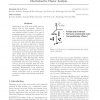Free Online Productivity Tools
i2Speak
i2Symbol
i2OCR
iTex2Img
iWeb2Print
iWeb2Shot
i2Type
iPdf2Split
iPdf2Merge
i2Bopomofo
i2Arabic
i2Style
i2Image
i2PDF
iLatex2Rtf
Sci2ools
125
Voted
ICML
2006
IEEE
2006
IEEE
Discriminative cluster analysis
Clustering is one of the most widely used statistical tools for data analysis. Among all existing clustering techniques, k-means is a very popular method because of its ease of programming and because it accomplishes a good trade-off between achieved performance and computational complexity. However, kmeans is prone to local minima problems, and it does not scale well with high dimensional data sets. A common approach to dealing with high dimensional data is to cluster in the space spanned by the principal components (PC). In this paper, we show the benefits of clustering in a low dimensional discriminative space rather than in the PC space (generative). In particular, we propose a new clustering algorithm called Discriminative Cluster Analysis (DCA). DCA jointly performs dimensionality reduction and clustering. Several toy and real examples show the benefits of DCA versus traditional PCA+k-means clustering. Additionally, a new matrix formulation is suggested and connections with rela...
Clustering Techniques | Dimensional Discriminative Space | Discriminative Cluster Analysis | ICML 2006 | Machine Learning |
Related Content
| Added | 17 Nov 2009 |
| Updated | 17 Nov 2009 |
| Type | Conference |
| Year | 2006 |
| Where | ICML |
| Authors | Fernando De la Torre, Takeo Kanade |
Comments (0)

